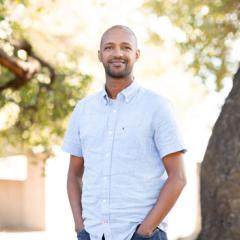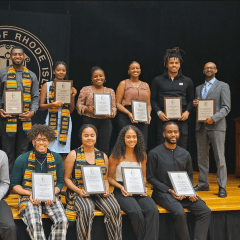About Asta's Work
Asta Zerue Habtemichael (he/his) is a PhD candidate in Chemical Oceanography at the University of Rhode Island’s Graduate School of Oceanography (URI-GSO) and a trainee in the STEEP Superfund Research Program. Asta is a mixed-method researcher who combines social science and natural science research methods to study the effects of contaminants of emerging concern in the environment and public health. Asta focuses on sources, fates and pathways of per- and polyfluoroalkyl substances (PFASs) and Organophosphate esters (OPEs). His current research draws upon environmental organic chemistry, trophic ecology, and public health in exploring the distribution and bioaccumulation of PFASs in the marine food webs.
After completing his PhD, Asta plans to work in a national or international research program at the interface of science and policy to understand chemical impacts within ecological health framework, to best inform prevention and mitigation efforts. Asta’s planned professional trajectory revolves around refining our scientific, regulatory, and cultural understanding of chemical pollution, to design a more inclusive and integrated approach to address persistent pollutants.
Before joining his doctoral program, Asta worked as a Graduate Assistant in the College of Marine Science and Technology (COMSAT) in Eritrea, where he studied the impacts of heavy metal pollution and ocean acidification in fish and shellfish species in Eritrea. He also led community-based initiatives focused on education, environmental stewardship and pollution remediation in Eritrea. He earned a B.Sc. in Applied Marine Sciences from COMSAT and a Master’s of Arts in Marine Affairs from URI. His prior work and academic experience informed his understanding of the connection between ecosystem health and human use; as a result, Asta is committed to address chemical and other pollution impacts through the same interconnectivity framework.
Beyond his research, Asta works to ensure accessible and inclusive science that integrates local and indigenous knowledge to create mutually beneficial research along with impacted communities. He is heavily involved in science communication and science education, where he leads various professional development workshops, trainings, and discussion events centering holistic inclusion to solve environmental problems via learning communities such as URGE and VOICES. He also co-designed core curricula in biomedical research as part of the MARC U* program at URI. He served as a scientist on interdisciplinary teams and committees setting policy to diversity and inclusion in STEM and co-created spaces and workshops that center the voices of minoritized scholars in environmental science at his institution, nationally, and internationally. He acts as coordinator and lead facilitator for the DIBP, a micro-credential certification program that strives to equip graduate students to be ambassadors of change in their discipline. He is an ambassador in the community of practice for the AGU LANDInG program. In his leisure time, he enjoys reading, running and playing soccer, and cooking traditional recipes from around the world.

